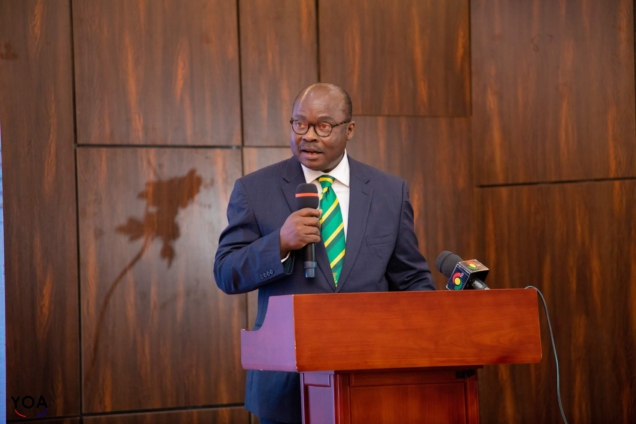The Governor of the Bank of Ghana, Dr. Ernest Addison, has stated that his administration started with a robust fiscal stance as the central bank financing from 2017 through to 2019 and 2021 was zero, even though the Bank of Ghana Act pegged it at 5% of the previous year’s tax revenue.
According to him, this pushed inflation down quickly.
Therefore, he added, the monetary policy rate also came down, and growth rebounded strongly, alluding that “This was the context for the first three years of the current administration”.
Furthermore, the Governor said on the sidelines of the ECCB 40th anniversary and Central Banking Autumn meetings in Saint Kitts and Nevis that “The early stages of the Covid-19 crisis also seemed manageable, growth was robust, but debt built up and restructuring was a challenge. The Bank of Ghana also engaged in monetary financing at a time when many central banks adopted accommodative policies.”
He mentioned that it was difficult to finance the government before the Covid-19 pandemic as “Prior to that, we had not done any monetary financing, that is financing of the budget had been zero”.
Providing financing support to government was not easy
Therefore, providing financing support to the government, he pointed out, was not an easy transition for the Central Bank to make.
“We had some good discussions going into it. The Finance Minister [Ken Ofori-Atta] went to Parliament and requested for a suspension of the Fiscal Responsibility Act due to the pandemic. This enabled us to trigger emergency provisions in the Bank of Ghana Act to provide exceptional financing for the government budget. And that’s what we did.”
“For me, it was a big reawakening, because I did not foresee that the Central Bank would be drawn into budget financing. But, given global developments, especially with central banks in advanced economies, it seemed like monetary accommodation of fiscal policy to meet Covid expenditures had become part of the norm.”, he noted.
In addition, the Governor said, the International Monetary Fund itself allocated additional SDRs, which are assets held by central banks, and designated these SDRs to help governments meet their Covid expenditures.
This meant the central bank could automatically lend on these additional resources to meet the needs of the budget, adding, this changed the psyche – having to on-lend IMF resources plus triggering the emergency provisions to provide central bank financing to the budget. This was difficult for me.
“Even in 2021, the government was able to successfully issue nearly $3 billion in debt. That helped to ensure the central bank didn’t have to provide financing", he concluded.
Latest Stories
-
ECOWAS deploys observers for Dec. 7 election
7 mins -
73 officers commissioned into Ghana Armed Forces
8 mins -
Impending shutdown of three power plants won’t happen – ECG MD
10 mins -
Ghana shouldn’t have experienced any ‘dumsor’ after 2017 – IES Boss
1 hour -
Lamens flouted some food safety laws in re-bagging rice – Former FDA Boss Alhaji Hudu Mogtari
2 hours -
Afcon exit: Our issue is administrative failure and mismanagement, not lack of talent – Saddick Adams
2 hours -
WAPCo to commence major pipeline maintenance and inspection from November 25
2 hours -
CEO of Oro Oil Ghana Limited Maxwell Commey listed among the 100 Most Influential People Awards, 2024
2 hours -
Power crisis: Amandi is off due to maintenance, not debt – ECG Boss
2 hours -
Votes cast for late Akua Donkor to be declared invalid – Electoral Commission
3 hours -
You can’t keep “incompetent” Otto Addo for the long term – Countryman Songo
3 hours -
Joy FM holds 2024 Prayer Summit for Peace
3 hours -
Lady sues Police and AG over assault in custody
4 hours -
Ghana’s railway sector has been revived under my leadership – Akufo-Addo
5 hours -
Next government must enforce C190 – Women Economic Dialogue Forum
5 hours

